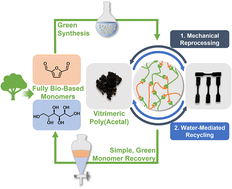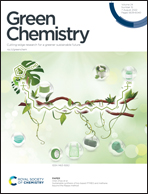Fully biomass-derived vitrimeric material with water-mediated recyclability and monomer recovery†
Abstract
Covalent adaptable networks (CANs) are polymers which demonstrate both high mechanical strength and self-healing/recyclability, which are important for extending material service lifespan and meeting sustainability demands. However, these materials are often derived from non-renewable petrochemical feedstocks, or by multi-step modification of bio-based feedstocks. Here, we disclose a fully bio-based vitrimeric poly(acetal) prepared from high volume sugar derivatives in a single step. The polymer was hard and rigid in the glassy state, exhibiting a tensile strength of 13 MPa and a storage modulus of 3300 MPa at room temperature, transitioning to the rubbery state at ca. 120 °C. Stress relaxation studies revealed an Arrhenius fit with an apparent activation energy of 110 kJ mol−1. Small molecule model studies indicate that the dynamic exchanges occur via an initial dissociation of the acetal into the aldehyde upon heating followed by reformation of new acetal bonds, rapidly reaching steady state. Thus, the polymer network was mechanically reprocessable simply by hot-pressing at 140 °C; with water-mediated recycling capable of restoring the material strength to its pristine state. Furthermore, the constituent monomers were recoverable simply by heating in green solvents (i.e. water or ethanol), meeting the closed-loop requirement of circular materials and fulfilling the principles of green chemistry.



 Please wait while we load your content...
Please wait while we load your content...